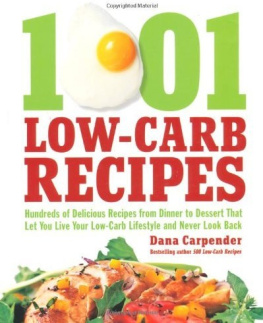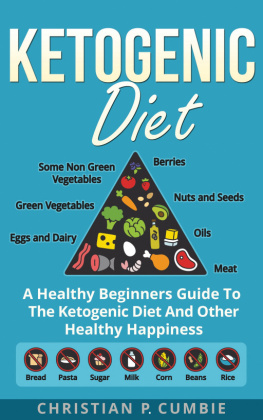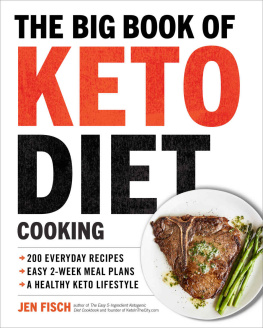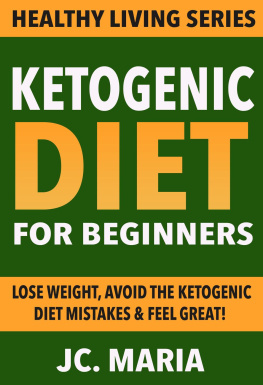DANA CARPENDER
500 KETOGENIC RECIPES
Hundreds of Easy and Delicious Recipes for Losing Weight, Improving Your Health, and Staying in the Ketogenic Zone

CHAPTER 1
Welcome to KetoWeve Been Here Longer Than You Thought
W ell, well, well, look at where we are. How things can change! In 2010, a blog reader asked me why the powers that be couldnt just admit theyd been wrong, that a low-fat, high-carb diet didnt worknot for weight loss and not for healthwhile a low-carb, high-fat diet did. I quoted an old saw: First they ignore you, then they ridicule you, then they fight you, then you win. Back then I added, Im pleased to report that were way past the ignore phase, moving from the ridicule into the fight stage. I hope to see win in my lifetime.
I am pleased to announce that win appears to be here. Nobody is laughing at carbohydrate restriction anymore. More and more people are accepting that fat, far from being the enemy, is a very powerful ally indeed. Somewhere, Dr. Atkins is laughing. Lets be clear: Ketogenic diets are nothing new. When Dr. Atkins Diet Revolution was first published in 1972, he had the nation peeing on ketone test strips and crowing about turning purple! I know: I was one of them, although at all of thirteen years old I was not ready for the concept of a permanent lifestyle change.
Indeed, many of us who have been eating a low-carbohydrate diet for a long timeI started in 1995and have been in ketosis for years. There has, however, been a change in focus. People have long referred to Dr. Atkins Diet Revolution and New Diet Revolution and other low-carbohydrate diets as high-protein diets. But Dr. Atkins never recommended a high-protein diet. He did advocate eating all the animal products one wished, but from the beginning, he recommended fatty meats, seafood dipped in butter, rich sauces, and heavy cream in your coffee. He openly advocated a ketogenic diet.
Then came the dreadful years when Americans were urged to slash fat from their diets, replacing it with healthy whole grains. We scraped the barest coating of butter or cream cheese on our bagels and felt virtuous using low-fat mayonnaise on our pasta salad. Everyone knew that it was fat that made you fat and sick. Which explains why, as more and more of us rediscovered low-carbohydrate diets after the abject failure of low-fat, high-carb diets, the high-protein diet moniker stuck: it was less scary, less controversial, than saying, Im eating a high-fat diet.
Huzzah! The day has come when we can openly proclaim, Im eating a low-carbohydrate, moderate-protein, high-fat diet. Why arent you? Or we can use the shorthand and just say, Im eating keto.
WHATS A KETONE?
Ketones, more properly referred to as ketone bodies, are a breakdown product of free fatty acids. When your body burns fatinstead of glucosefor fuel, ketones are created. These, in turn, serve as fuel for tissues that cannot use fat for fuel, most notably the brain.
When the Atkins Diet first hit in 1972, the presence of ketones was largely seen as proof that your body was, indeed, using fat as its primary fuel source. Recent research indicates that ketones are considerably more important than that.
NOT JUST WEIGHT LOSS
In a 2013 article appearing in the European Journal of Clinical Nutrition, researchers concluded (emphasis mine), Recent work over the last decade or so has provided evidence of the therapeutic potential of ketogenic diets in many pathological conditions, such as diabetes, polycystic ovary syndrome, acne, neurological diseases, cancer and the amelioration of respiratory and cardio-vascular disease risk factors.
The possibility that modifying food intake can be useful for reducing or eliminating pharmaceutical methods of treatment, which are often lifelong with significant side effects, calls for serious investigation.
Gee, you think?
Its generally accepted that low-carb, high-fat diets work for weight loss. Still, many have worried that weight loss came at the cost of general health, that fatty meat, butter, mayonnaise, and heavy cream were going to give us heart attacks or destroy our kidneys. From the beginning, I found it hard to believe that a diet that made me feel so much betterand resulted in great blood workwas actually a stealthy killer. So, it has been with growing delight and great satisfaction that I have watched the research into the benefits of a ketogenic diet burgeon. Long used for seizure control, ketogenic diets are showing promise for treating myriad health problems.
A study published in 2011 in the scientific journal PLOS ONE looked at the effects of a ketogenic diet on diabetic nephropathythe most common cause of kidney failurein diabetic mice. The result? Two months on a ketogenic diet actually reversed kidney damage. Such reversal has hitherto been virtually unheard of.
In August 2013, the Clinical Journal of the American Society of Nephrology published the results of a small human trial, again showing an improvement in kidney function in type 2 diabetics with nephropathy after twelve weeks on a ketogenic diet. I find this not only wonderful, but happily ironic, considering how many times Ive been told that my diet will damage my kidneys.
In 2012, in the journal Nutrition, Richard D. Feinman, M.D., and Eugene Fine, M.D., published groundbreaking work regarding the effectiveness of such diets in inhibiting cancer growth by reducing insulin signaling.
In 2016, a study was published in Frontiers in Molecular Neuroscience regarding the effects of a ketogenic diet on glioblastoma, a particularly devastating kind of brain tumor. It states that a ketogenic diet does reduce tumor growth. This has been attributed to the fact that cancer cells are glucose dependent. The authors added, however, that additional studies in vitro have indicated that increasing ketones such as -hydroxybutyrate (HB) in the absence of glucose reduction can also inhibit cell growth and potentiate the effects of chemotherapy and radiation. In other words, its not simply that a ketogenic diet drastically reduces the supply of the glucose cancer needs to grow; ketones themselves appear to inhibit cancer growth even when glucose is provided.
In 2006, the journal Behavioral Pharmacology published an article about the benefits of a ketogenic diet for a broad range of neurological illnesses. Ketogenic diets have long been used to treat epilepsy, but are now showing promise for treating Parkinsons disease and Alzheimers as well. As I write this, I have on my desk the newly published book The Alzheimers Antidote, by Amy Berger, MS, CNS, NTP, about the promise of ketogenic diets to prevent or treat dementia. Having watched my mother succumb to dementia, this is, for me, the most thrilling possibility.
The same article in Behavioral Pharmacology also states that ketogenic diets are being explored for limiting inflammation in general. Because inflammation now appears to be the root of a great deal of illnesses, from heart disease to cancer, this is no small thing.
In 2005, Nutrition & Metabolism published an article regarding a pilot study of a ketogenic diet for treatment of polycystic ovary syndrome (PCOS). The study found that the diet not only caused significant weight loss, but also improved hormone balance and lowered fasting insulin. I have been fortunate enough to speak with two top-flight reproductive endocrinologists, Michael Fox, M.D., of Jacksonville, Florida, and Gil Wilshire, M.D., of Columbia, Missouri. Both consider a very low carbohydrate diet an essential intervention for PCOS and one of the most powerful tools in their fertility practices.















